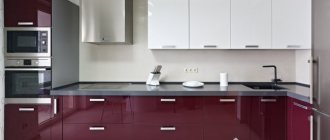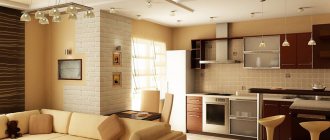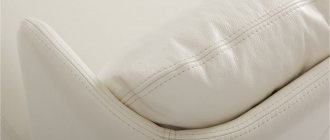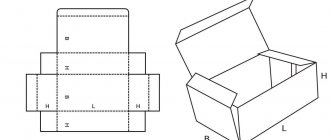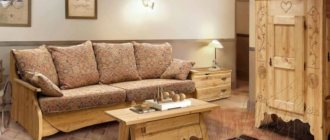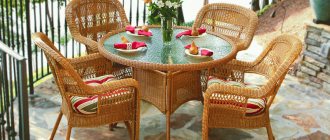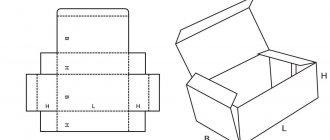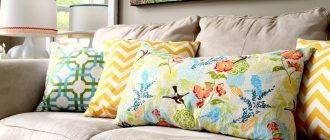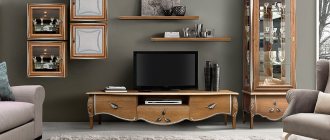In everyday life, we often encounter problems that arise due to confidence in the correctness of our actions. Therefore, our task for today is to give advice that will extend the life of your furniture and make it cleaner. From caring for marble countertops to cleaning facades, we share with you secrets that will make your life easier.
Simple tips on how to properly care for your kitchen
How to properly care for your kitchen?
What cleaning products should be used to ensure that the original shine and gloss do not disappear? Why do the kitchen fittings turn dark? There are many questions, but the answers are simple; we share with you simple secrets of caring for your favorite kitchen. In order for a kitchen set to please you with its original appearance for a long time, caring for it requires certain knowledge. Felicita furniture professionals give recommendations on how to care for your kitchen
from certain materials, the specific qualities of which must be taken into account.
How to ensure a long life for your headset?
- Avoid prolonged exposure to directed sunlight on the façade.
- Get rid of dirt on the façade as soon as you notice it.
- Try to protect the surface of the furniture from excess moisture.
- Wash furniture with soft cloths or sponges soaked in water and detergents that do not contain alkali or acid, or abrasive particles.
If you have a ventilation system installed in your kitchen, this will help prevent grease and steam from settling on the furniture, and therefore increase the service life of the set.
Kitchens with plastic fronts
They belong to the class of easy-to-maintain facades that can be treated with various cleaning products that do not contain chlorine and abrasives. Since the surface of the plastic is resistant to the penetration of any substances, caring for such a kitchen is not difficult. The advantage of this material is its resistance to scratches, but not when using hard brushes, sponges with a special layer of metallized fiber, or scrapers.
If aluminum profiles are used in the finishing of plastic facades, then caring for them does not involve the use of aggressive solutions (solvents, alkalis, acids or preparations containing them). Cleaning with special products and polishing with a dry cloth will restore the shine of the metal.
Facade cleaning
Wooden facade
Natural wood, more than other materials, needs proper care.
Contaminants from the surface of a wooden façade should be cleaned in the direction of the wood grain. Dry cleaning can be done with a vacuum cleaner with a soft attachment.
Water getting on a wooden facade is not dangerous, since solid wood kitchen surfaces are coated with special wax. But steam cleaning is unacceptable for him.
Facade made of artificial materials
The glass facade is wiped with a soft cloth or sponge without hard inserts, moistened with a liquid for cleaning glass and mirrors.
An aqueous solution of denatured alcohol is suitable for removing heavy dirt or degreasing.
Cleaning powder and hard brushes can scratch the glass and make it dull. Soap and all-purpose detergents leave untidy stains on the glass; it is also better to avoid them.
In the photo: kitchen Lago 271 with a glass facade.
All these recommendations are suitable for stainless steel elements.
How to clean a glossy kitchen
Nowadays, kitchens with glossy surfaces on facades are at the peak of popularity. Favorites among kitchen furniture, they are always stylish, impressive and add a special charm to the interior of the room.
Any glossy kitchen photo
which adorns the gallery of photographs, can be ordered by you.
Caring for a glossy set requires care. It is necessary to prevent prolonged exposure to sunlight on the surface of facades. Grease stains should be removed with a soft cloth moistened with special solvent-containing solutions or wiped with a microfiber cloth using glass cleaner.
The fight against dust settling on a glossy surface should be carried out using antistatic agents designed for such furniture. After their exposure, a thin film is formed on the façade, preventing the rapid settling of dust particles.
Special Recommendations
Italian kitchens are made from modern natural and artificial materials, often using innovative technologies (for example, Bacteria Blocker Silverguard ® from Veneta Cucine). Caring for such furniture includes additional recommendations.
You can find out about the features of a specific Italian cuisine by calling or visiting our office. Our specialists will tell you in detail about the furniture you are interested in and the features of its operation.
With proper care, an Italian kitchen will serve you for decades, maintaining its impeccable appearance and functionality.
Caring for countertops and wall panels
When selecting countertops and wall panels, give preference to high-quality materials that are resistant to high temperatures and abrasion. This is especially true for countertops, as the most vulnerable element. After all, its surface is used in kitchen processes. Hot containers and metal accessories (for example, cutlery stands) are often placed on the countertop. Therefore, the main requirement for care is careful use.
For cutting and beating, use only cutting boards. Remove red wine or juice stains immediately to eliminate possible traces of them. Various types of stands and thermal wipes made from plastic, bamboo or straw protect the surface of the tabletop well from scratches. They are practical to use and easy to clean.
After completing work processes on the countertop and wall panel made of natural stone (granite or marble), try to blot off all drops of moisture. Or treat them with products with a water-repellent effect. Treat oil stains or acid drops with a neutral cleaning product.
Problem #2. The glossy surface of the furniture has yellowed or faded
Unfortunately, over time, the glossy finish may lose its original color and acquire a yellowish or greenish tint. This usually happens in places exposed to sunlight, and only with cheap facades coated with polyurethane varnishes or PVC films of suspicious quality. Acrylic coatings are more expensive, but they are more UV resistant and will not yellow over time.
Painted MDF facades can also turn yellow over time - if they were coated with alkyd-based paints.
At first, the color of this set was the same as that of the refrigerator.
It is no longer possible to restore the original color using household chemicals. One of the ways to return facades to their “former greatness” is by sanding and painting with high-quality enamel or pasting with a good film (not Chinese). But finding a contractor who will agree to carry out such a restoration will be quite difficult.
An easier option is to completely replace the doors. In this case, based on past mistakes, you can choose a glossy acrylic, plastic or wooden kitchen.
If the yellowness appears as a result of many years of exposure to grease and soot on the furniture, then you can try to clean it:
- Mix vinegar or wood cleaner with water in a 1:1 ratio and pour the resulting solution into a spray bottle.
- Spray in some inconspicuous place, wipe several times in a circular motion with a soft sponge, after wearing rubber gloves. After making sure that everything is fine with the surface, wipe all yellowed areas.
- Rinse the sponge thoroughly with clean water and rinse the solution from the facades.
- Wipe everything with a soft, dry cloth.
If this method does not help, you can try a special paste for washing furniture and bathroom fixtures in the kitchen. Also apply a little to an inconspicuous area first to make sure it is safe.
How to update furniture yourself?
Painted furniture that has lost its fresh appearance may not need to be cleaned or washed - no matter how hard you try, the situation will only be corrected by updating the color. To make the furniture sparkle with new shades, cover it with a thin layer of oil paint and wait until it dries thoroughly, then coat the furniture with enamel to add shine. Let's reveal a little secret: in order for the surface to emit a mirror shine, the enamel must first be heated in a water bath at a temperature of 50 degrees Celsius and stirred.
How to clean a matte kitchen from stains
If you choose and use the wrong detergents, you often have to clean a matte kitchen from stains. In this case, you need products that gently but effectively break down fats and do not contain ammonia and acids. For care and protection, you can use silicone-based furniture polishes.
- Moisten a soft cloth with a small amount of product;
- Clean the facade from dirt and immediately polish it with a dry cloth.
Catalog of matte kitchens
Conclusion
Buying matte kitchen furniture, especially custom-made ones, is an opportunity to decorate the space beautifully and comfortably, taking into account your preferences. Practicality, the ability of furniture to maintain its appearance at minimal cost is an important point that should be paid attention to when developing a design project.
Ask the experts which facades are easier to care for, choose an option based on color, texture - find a solution so that during the most ordinary cleaning it will be easier for you to wash the matte surface of the kitchen unit and easily return it to its proper appearance.
So that the furniture shines with cleanliness, and you with delight
To carefully and effectively clean your kitchen unit from grease and dirt, use regular laundry soap. Grate it on a fine grater and dilute it in warm water until a soap solution forms.
Laundry soap diluted in water will help to wash the plastic surface without unnecessary damage.
Clean in three steps:
- First apply the solution to it;
- Then wipe first with a wrung out damp cloth and then with a dry cloth;
- Be sure to ventilate the room.
Soap solution is the most harmless for glossy finishes of kitchen units, but does not always give a good result.
To effectively clean facades, many housewives quite successfully use:
- Glass cleaners (without ammonia);
- Special sprays for glossy finishes;
- Detergents for shower cabins;
- Shampoos and liquid soap;
- Dishwashing detergents;
- Wax-free polishes;
- Hydrogen peroxide.
To wash surfaces with a glossy facade, use non-abrasive detergents.
If you find a fresh greasy stain or dirty streaks on the facade, try wiping them off with light pressure with a flannel cloth moistened with glass cleaner.
For painted glossy facades it is good to use glass cleaner.
IMPORTANT! Carry out such cleaning as often as possible - and you won’t have to make heroic efforts to remove old defects.
It is recommended to apply the product to the facades and wipe with a dry microfiber cloth.
The glossy facade will retain its radiant shine for a long time if you handle it with care.
Select cleaning products carefully and use wipes made of soft and non-woven materials.
Decorative plastic (DBSP)
Waterproof and resistant to mechanical stress.
Kitchens with plastic coating must be washed with gentle detergents.
But it is defenseless against the action of chemically active substances:
- Chlorine-based substances “wash out” the color from such material;
- Wax polishes turn into a sticky film that is difficult to remove;
- Alcohol-based compounds cause the gloss to become dull;
- Detergents containing acids form dirty, indelible stains and stains - so no “domestos”, “comet” and “silita”.
Glossy plastic tends to lose color brightness, so be careful when choosing detergents.
What and where not to use
Cleaning the kitchen surface is not a difficult task. The main thing here is not to cause damage or minor scratches; on many types of coating they cannot be removed. Therefore, you need to adhere to several rules about what and where you cannot use:
- Do not use large amounts of water when cleaning surfaces. There are several types of coatings for which water can cause delamination from the composite, for example plastic or PVC film. To remove dirt, you need to choose wet wipes or cloth and be sure to remove the moisture with dry material afterwards.
- All items that can cause scratches are prohibited. Do not use dish sponges, hard brushes, etc. Soft flannel or microfiber cloths, disposable wet wipes - all this will be the best solution for cleaning facades.
- Do not use abrasive powders or products with aggressive composition. Solvents or acid damage the very structure of the coating, especially plastic. After exposure, the surface becomes covered with cracks, and after exposure to chlorine and alcohol-containing substances, it becomes discolored, dull or yellow. The same consequences await facades after the use of other chemicals: acetone, turpentine, ammonia, nitroglycerin, synthetic resins.
- Do not steam greasy stains using a steam cleaner. High temperatures destroy the upper layers of the facade.
Before washing your kitchen, you need to carefully study the instructions for its care or follow all the above tips. Then cleaning your kitchen unit will become a joy, not a burden.
Load distribution
The permissible load on the drawer is up to 5 kilograms. Inside the box, heavier items are placed closer to the edges to evenly distribute pressure on the bottom. Multi-tiered cabinets are loaded mainly at the bottom, leaving space at the top for light items. To prevent cabinet doors from sagging, they must be kept closed.
In the production of kitchens, modern technological fittings are used that do not require special care. In order for all parts of the kitchen to work properly, it is enough to follow the operating rules specified in the attached instructions.
Furniture with complex mechanisms must be assembled by a professional. When ordering a kitchen from Agata Furniture, delivery and assembly of furniture is included in the list of services provided.
